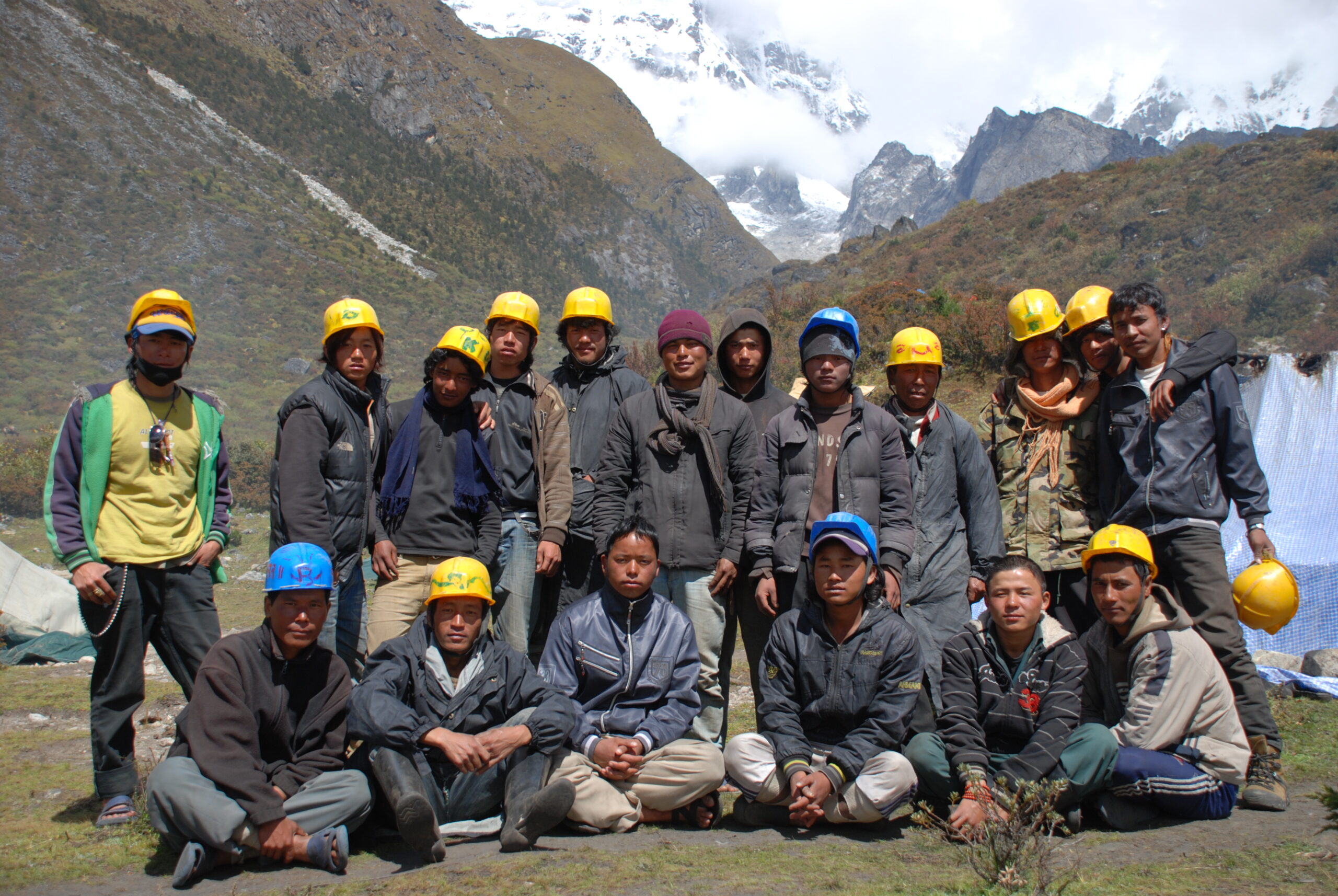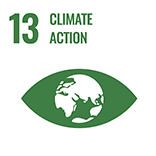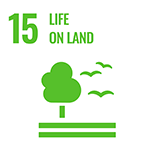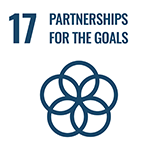Reducing climate change induced risks and vulnerabilities from Glacial Lake Outburst Floods in the Punakha, Wangdue and Chamkhar Valleys

Summary
This project was implemented in Bhutan between 2008 and 2013. Its main goal was to enhance the adaptive capacities needed to prevent climate change-induced disasters in Bhutan.
Driven by the rapid retreat of glaciers caused by rising temperatures, the formation of glacial lakes and the potential occurrence of glacial lake outburst floods (GLOFs) stands out as one of the most significant natural hazards that climate change has posed to Bhutan. In recent decades, the risk of potential disasters associated with these phenomena poses new threats not only to the lives and livelihoods of people in the mountains and surrounding lowlands, but also threatens important economic sectors such as forestry, hydropower and agriculture, which are key to the development of these regions.
The project “Reducing climate change induced risks and vulnerabilities from Glacial Lake Outburst Floods in the Punakha, Wangdue and Chamkhar Valleys” was launched by the Royal Government of Bhutan and had the objective to reduce climate change-induced risks and vulnerabilities to GLOFs in two areas previously identified high-priority areas. The various activities carried out were intended to contribute to risk reduction, safety improvement and awareness raising. In addition, lessons learned from the project were intended for subsequent scaling up and replication of early warning systems in other GLOF disaster-prone areas.
Overview
- Location:
- Implementation sites:
- Single country
- Single location
- Mountain region:
- Himalayas
- Site locations:
Punakha, Wangdue and Chamkhar Valleys
- Solution scale:
- Ecosystem type(s):
- Solution type(s):
- Climate impact(s) addressed:
- Impact time-scales:
- Co-benefits:
- Implementation timeline:
- 2008 - 2013
Solution details
Main beneficiaries & outcomes
The main beneficiaries from this project are considered to be those local communities living at the affected river valleys where the project was implemented and which saw their disaster preparedness and awareness enhanced. While on the national level, governmental capacities to cope with climate-induced hazards and to implement, evaluate and replicate risk reduction and preparedness measures for GLOFs were increased.
Project’s outcomes included:
- Outcome 1: Improved national, regional, and local capacities to prevent climate change-induced GLOF disasters in the Punakha-Wangdi and Chamkhar Valleys
- Outcome 2: Reduced risks of GLOF from Thorthormi Lake through an artificial lake level management system
- Outcome 3: Reduced human and material losses in vulnerable communities in the PunakhaWangdi Valley through GLOF early warnings
- Outcome 4: Enhanced learning, evaluation, and adaptive management.
Finally, other beneficiaries included numerous workers participating in the execution of engineering works in high mountain areas. They included members (many of them women) of poor communities from various parts of the country and benefited from well-paid temporary jobs.
Planning and implementation
The project was implemented by the Royal Government of Bhutan through the Department of Geology and Mines (DGM) of the Ministry of Economic Affairs, which had the expertise to deal with GLOF-related risks and functioned as the main executing agency, as well as by the Disaster Management Division (DMD) of the Ministry of Home and Cultural Affairs, and the Department of Energy (DOE). These departments were responsible for the timely delivery of project inputs and outputs, and for the necessary coordination with other relevant agencies. Central to this was the formation of a Project Management Unit (PMU) headed by two project managers, one from DMG and one from DMD.
In addition, a Project Board (PB), chaired by the Secretary of the Ministry of Economic Affairs, provided extensive guidance and oversight during the implementation process, while a Technical Advisory and Support Team (TSAT) assisted with technical support during the construction of the artificial water lowering (outcome 2).
Finance
The cost of the project was covered by funding from various sources. The amounts of funding were as follows:
|
Financing Amount: |
|
Total amount: US$7,481,274 GEF (Least Development Countries Fund): US$3,445,050 UNDP: US$ 396,224
|
|
Co-Financing Total: |
|
Royal Government of Bhutan (in-kind): US$ 2,680,000 Austrian Development Agency: EUR$600,000 WWF Bhutan: US$30,000 Punatsangchhu Hydropower Authority: $Nu. 20 million |
Innovation
The technical approaches to lake mitigation and the establishment of a robust early warning system in the project implementation areas can be considered an innovative aspect in the realization of this solution. Globally there are very few examples of GLOF early warning systems implemented.
Furthermore, both the engineering works required to artificially lower the lake levels and the installation of the early warning systems relied heavily on human labor (including for the transportation of equipment and supplies). This particularity addressed at the same time a completely different problem in the area – namely the lack of employment opportunities, leading to an innovative win-win approach.
Performance evaluation
To ensure the good performance of the project, a Project Inception Workshop was conducted initially which involved the participation of the full project team. Among other things, the workshop was highly useful for the establishment of a clear monitoring strategy, including precise and measurable performance indicators, their means of verification, and their required budget, all which were aligned to the expected project’s outcomes.
The evaluation approach consisted of the daily monitoring of implementation progress under the responsibility of the Project Managers from the DGM and DMD, periodic monitoring undertaken by the UNDP-Country Office through quarterly meetings with the project proponent (or more frequently when necessary), and annual monitoring. This last entailed the submission of an annual project report, followed by a policy-level meeting of all parties involved in the implementation of the project. Field sites were visited on a yearly basis to assess project progress.
Moreover, a mid-term and a final evaluation were also carried out by a team that included external consultants, technical advisors, project team members, and UNDP and GEF members.
Long term project sustainability and maintenance
The long-term sustainability of this project is highly dependent on institutional capacity and sustainability, for which reason, strong government support was ensured at both the central and local levels during the planning and implementation processes. With the aim of improving capacity building at all governmental levels, the project not only incorporated specific capacity building components, but also a disaster risk management program that enabled both communities and authorities to better cope with climate-related impacts.
Additionally, a maintenance plan was created to ensure the future functionality of the project. The Department of Energy (DoE) emerged as the main responsible actor for carrying out maintenance works of the Early Warning Systems after completion of the project.
Capacities for design and implementation
Knowledge
The need to improve knowledge capabilities was a major motivation for the creation and implementation of this solution. It is considered a key competency towards the integration, coping and assessment of GLOFs and other climate change related risks in the high mountain areas of the country. Therefore, through its various inputs, this solution sought to increase the skills and knowledge of local communities and various levels of government on GLOFs risk reduction, with an important emphasis on training in the operation, maintenance and testing of Early Warning Systems, as well as in the artificial lowering of glacier lake levels. In all these cases technical assistance was provided and documented for possible future use.
Technology
The existence of widely available technologies needed for the development of climate change projections, the assessment of glacial lake levels, and the generation of early warning systems were very important in the design and implementation of this project. For example, in the initial stages, these capabilities helped in the establishment of priority areas for project implementation.
Furthermore, project efforts also included the transfer of such technologies to other GLOF-vulnerable areas of Bhutan for their future integration and replication.
Political / Legal
The design and execution of the project “Reducing climate change induced risks and vulnerabilities from glacial lake outburst floods in the Punakha, Wangdue and Chamkhar Valleys” received enormous support from the Bhutanese authorities within all levels. This project not only emerged from a clear mandate from the Royal Government of Bhutan, which considered its implementation as a national priority to address the adverse effects of climate change in the country but also benefited from the involvement of different government departments that took full responsibility for its implementation.
At the same time, the activities carried out as part of the solution served to address some of the most urgent priorities previously identified by the National Adaptation Programme of Action (NAPA), and supported the National Disaster Risk Management Framework (NDRMF) and other central policies that currently shape Bhutan’s approach on how to deal with expected climate-change related hazards.
Institutional
The institutional capacities of the different participating authorities and other collaborators were essential during project implementation. In fact, the improvement of these capacities for the subsequent planning and implementation of risk reduction and disaster recovery preparedness strategies was one of the main objectives pursued by the project. These capacities can later be transferred to other types of natural disasters in the country.
Several coordination mechanisms were established to facilitate work and communication among stakeholders, such as a Project Board, a Technical Support and Advisory Team, and a Project Management Unit. Moreover, each of the four project outputs was implemented under the responsibility of the Department of Geology and Mines (DGM) or the Disaster Management Division (DMD).
Socio-cultural
Local communities in the Punakha-Wangdi and Chamkhar valleys, as well as in the upstream region near Lake Thorthormi, were important stakeholders and participated in most of the project outcomes. They were involved in key activities such as engineering works carried out to lower the lake level, installation of weather stations, transportation of equipment and other supplies to the implementation sites with the use of mules, and more.
Thanks to the public’s involvement, community members and community-based organizations had their capacities strengthened to improve communication, public awareness, and the response to GLOF early warnings.
Outlook & Scalability
Barriers and adverse effects
Potential barriers to the effective operation of the early warning system include the possibility of false alarms due to technical failures, even in the absence of an outbreak, which could prevent the local population from taking the siren warnings seriously. Also, noise from construction work at a nearby hydroelectric power plant could prevent the sirens from being audible in the event of a real event.
Furthermore, despite the known importance of integrating indigenous and local knowledge into the design of climate change adaptation solutions, such knowledge needs to be mapped and recorded, but there is no evidence that any such studies have been conducted in relation to GLOF events in Bhutan.
Transformation and future outlook
Thanks to the adequate initial assessment of the weakness and needs on the risk management subject, the project supports fundamental change in the high mountain areas of Bhutan by increasing the capacities of national and local authorities to better cope with current and projected climate impacts, demonstrating a focus on the future and on a long-term change.
Efforts made under the solution enable a more efficient design, implementation, evaluation and replication of similar projects in other areas on a national and international scale. At the same time, it also helped preparing local communities to react to and cope with GLOFs by providing new knowledge and skills in the field.
Potential for upscaling and replication
The replication of the solution in other GLOF-vulnerable areas at the national and international scales is desirable and was planned since the initial design of the project by the corresponding authorities. To this purpose, the operational lessons learned and documented from this project would be of valuable importance, supported by the increased institutional capacities that will enable an effective implementation.
Finally
Acknowledgments
The description of this solution was prepared based on the official Project Document published by the United Nations Development Program (UNDP) in 2007, as well as other relevant documents available on the UNDP official website which can be accessed at https://www.adaptation-undp.org/projects/ldcf-glof-bhutan .The description of the solution reflects the views of the authors and not those of the UNDP, the Royal Government of Bhutan, the Global Environment Facility (GEF), or any other project partner. Julia Aguilera Rodriguez completed the survey information, while Simon Allen reviewed the solution description.












(0) Comments
There is no content